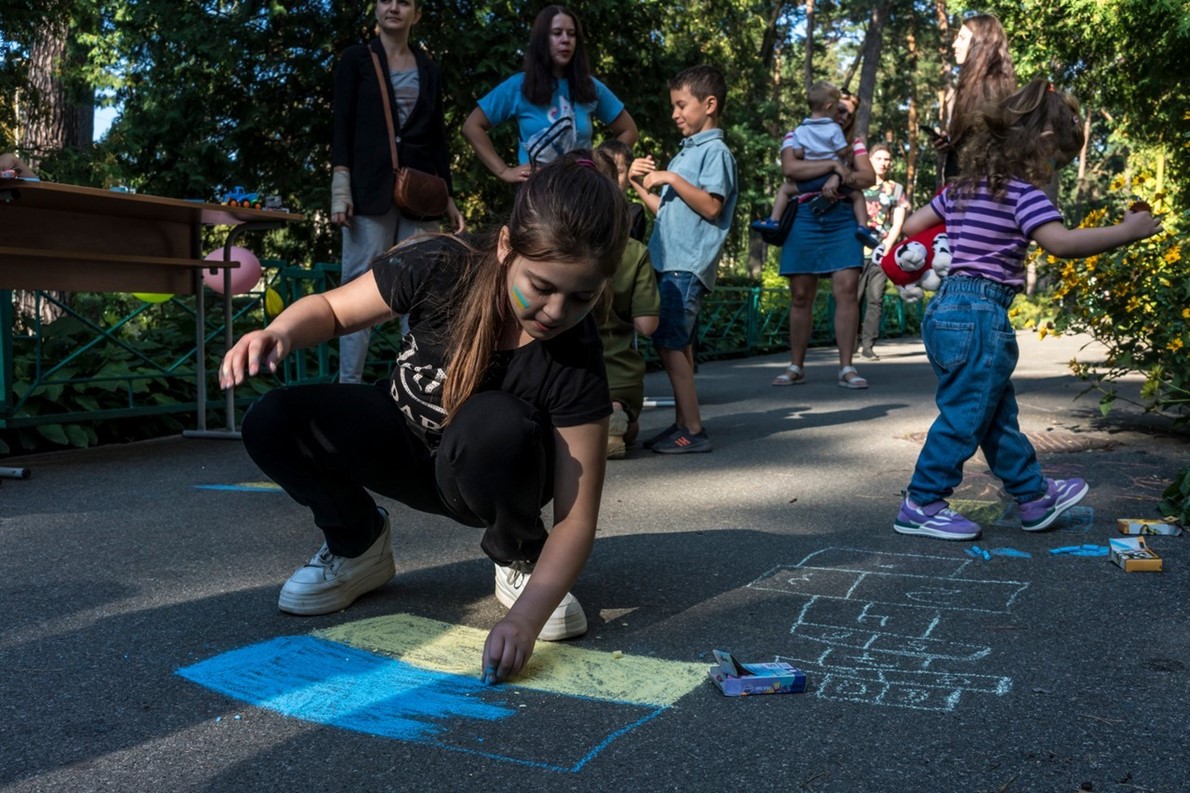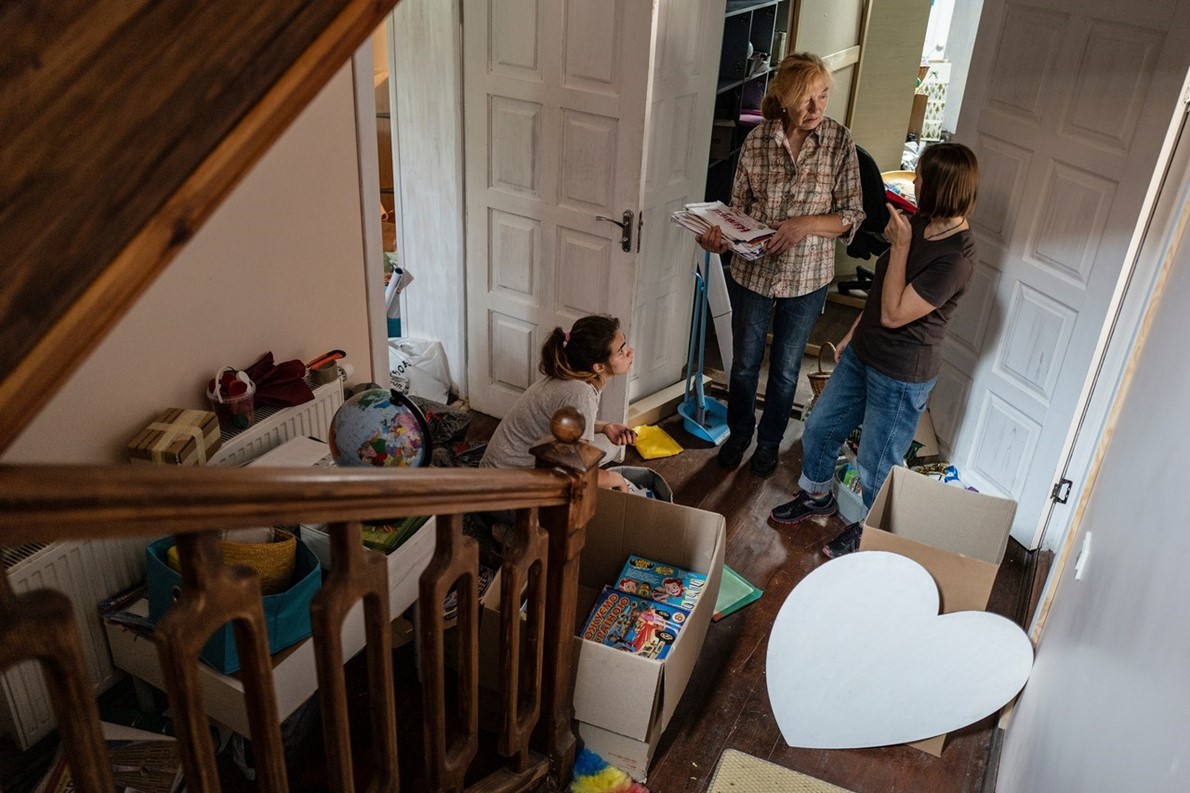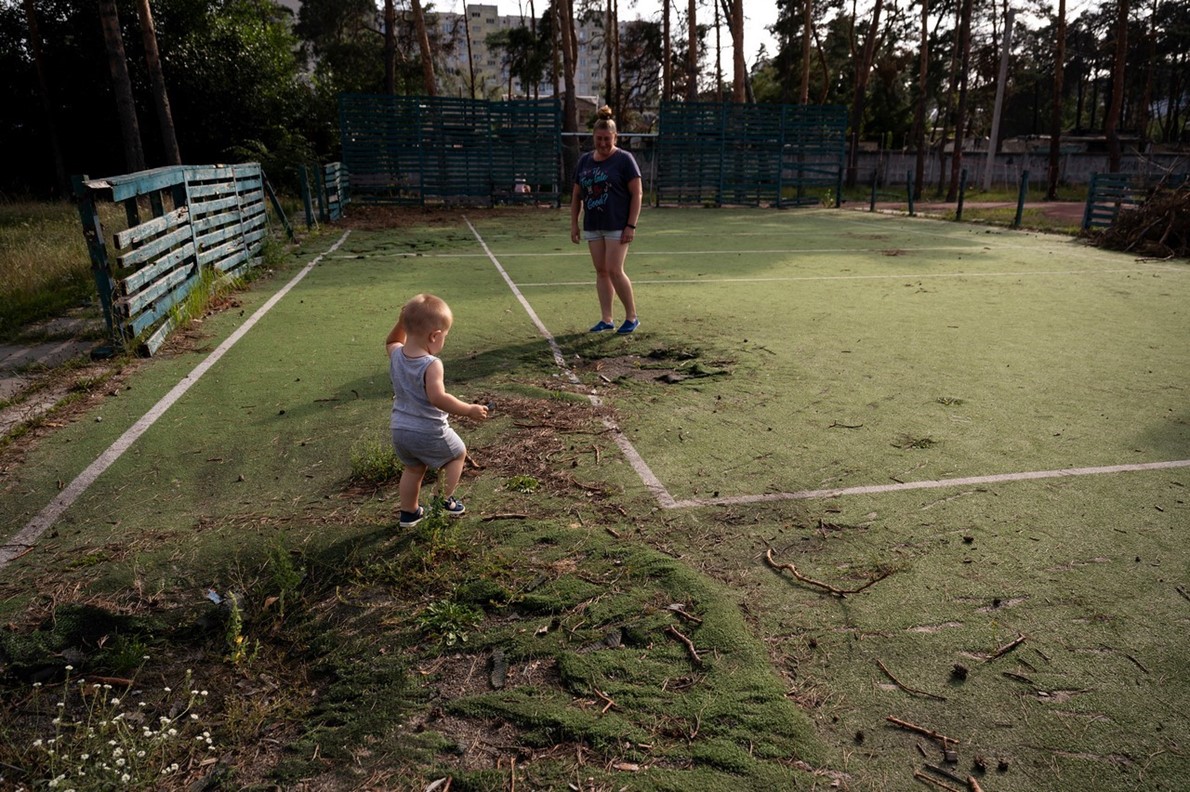BUCHA, Ukraine — The bodies that littered
the school playground in April are gone. The blood on the walls has been
scrubbed clean and shattered windows mostly repaired.
اضافة اعلان
Still, School No. 3 in the
Kyiv suburb of Bucha, the
site of some of the worst Russian atrocities of the war, did not open when
classes began Thursday for millions of
Ukrainian children. The reason for the
delay: All schools are now required to have bomb shelters, and School No. 3’s
basement, which residents say was once used as a torture chamber by Russian
soldiers, is still an off-limits crime scene.
For six-year-old Vera, who says she loves math and
castles, that means remote learning. She had looked forward to the first day of
school, when, according to tradition, first graders are hoisted on the
shoulders of older students to ring a bell to usher in the school year and kick
off a day of celebrations.

Instead, the day before school was to begin, she sat
at a solitary desk outside her school in Bucha, posing with a bell in hand. She
smiled, but only briefly, and her mother, Lyudmila, said she was upset to not
be in a classroom despite the school’s attempts to make the day festive with
singing and a small ceremony.
“It is a bleak and unwelcome experiment in childhood
suffering,” James Elder, spokesperson for
UNICEF, the UN Children’s Fund, said
in an interview.
With sandbags outnumbering backpacks, class sizes
limited by how many children can cram into bomb shelters, and schools being
supplied with first-aid kits, the day was not so much an end of summer recess
but a continuation of the bleak season of war. Thousands of schools have been
damaged by Russian bombs and rockets, hundreds completely destroyed and for
millions of children a day normally filled with excitement and anxiety started
with a lesson in what to do when the air raid alarm wails.
It is a bleak and unwelcome experiment in childhood suffering,
And that is for the children who can return to
classes at all. With thousands of schools damaged or destroyed, Elder said, less
than 60 percent are expected to open on time.
An estimated 2.8 million of the nation’s 6 million
children have been forced from their homes because of the war. If they are
fortunate enough to find a seat in a classroom, it will probably be in an
unfamiliar town or city. An additional 2 million children are estimated to be
living outside Ukraine and will either log on remotely for schooling with
Ukrainian teachers or try to integrate into new schools with classes taught in
foreign tongues.
And then there are the hundreds of thousands of
Ukrainian children living under
Russian occupation in the east and south of
Ukraine, where Moscow is trying to impose the new Russian curriculum and
teachers who refuse to cooperate face harsh reprisals, including kidnapping and
torture, according to Ukrainian officials.

Over the past week, an average of 500 families have
been recorded leaving occupied territories in the southern regions of Ukraine
each day, according to the National Resistance Center, a government agency supporting
resistance efforts in occupied areas. One of the main reasons given, the agency
said, was the approaching school year, with parents desperate to shield their
children from Russian propaganda in the new curriculum.
Even as the Russian military confronts an
intensifying counteroffensive and ammunition depots in occupied territories are
hit nightly by Ukrainian forces, Moscow remains engaged in a concentrated
effort to Russify the population in areas under its control.
One of the most difficult questions for parents considering returning is whether their children can go to school in a safe environment
The schools are a central part of that campaign.
The Russian education minister, Sergey Kravtsov,
said in late June that the Ukrainian education system “must be corrected.”
According to Moscow, that means teaching a version of history that aligns with
the false Kremlin narrative that there is no such thing as Ukrainian
nationhood.
Yuri Sobolevsky, the exiled deputy head of the
Kherson regional administration, said that Russian forces were terrorizing
schools and had recently kidnapped a local principal who refused to teach the
Kremlin’s curriculum.
“There is a tremendous pressure on all school
principals throughout the region,” Sobolevsky said.
From Yemen to Syria, what we have learned is that children just absolutely need this psychological break from war,
Teachers are receiving training in how to treat
battlefield wounds and what to do in case they come across unexploded ordnance.
UNICEF said that it had reached about 1.7 million
children and their caregivers, offering psychological and other support.
“From Yemen to Syria, what we have learned is that
children just absolutely need this psychological break from war,” Elder said.
“And attending class plays a critical role in that.”
The fact that schools are opening at all in Bucha
and in other hard-hit towns and cities across Ukraine is in many ways
remarkable.
Anatolii Fedoruk, the mayor of Bucha, said that in
the first days of the war, many families sought shelter in schools, thinking of
them as places of refuge.
“They were wrong; they were not safe,” he said.
During 32 days of Russian occupation, he noted, schools were turned into firing
positions and places of oppression.
He spoke outside School No. 5, where a tank had
taken position in the schoolyard, the blackened walls of a high-rise apartment
building across the street testimony to the violence.
Fedoruk credited the nonprofit Global Empowerment
Mission, a disaster-relief nonprofit, with providing the much-needed assistance
to get the town’s 15 schools rebuilt so that most could open September 1.

“One of the most difficult questions for parents
considering returning is whether their children can go to school in a safe
environment,” he said. “This is not a full postwar rebuild, this is about
getting kids in classes and parents back home.”
But many families have nowhere to return. Whole towns and
cities in eastern Ukraine have been essentially razed and many of those
families fled west early in the war.
Read more Education
Jordan News



